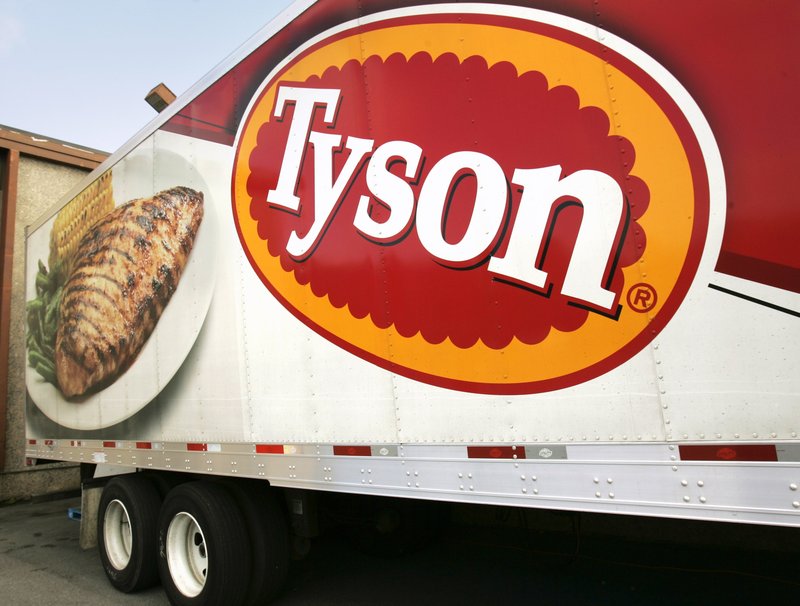Tyson Foods Inc. on Monday reported profits and sales for its first quarter that widely missed analysts' estimates, with the company's meat segments under-performing while the prepared foods segment showed strength.
The company reported net income of $316 million, or 88 cents per share, for its fiscal 2023 first quarter that ended Dec. 31, compared with $1.1 billion, or $3.07 per share, for the year-ago quarter. A consensus estimate of nine analysts put net income at $1.36 per share, according to Yahoo Finance.
Springdale-based Tyson reported sales for its first quarter of fiscal 2023 of $13.26 billion, up 2.5% from $12.93 billion a year ago. A consensus estimate by nine analysts for the period was $13.5 billion.
Tyson released its earnings early Monday before markets opened, and hosted a call with analysts shortly afterward. Tyson shares fell $2.95, or 5%, to close Monday at $61.08 in trading on the New York Stock Exchange. Shares have traded as low as $59.38 and as high as $100.72 over the past year.
During the call, company executives said the prepared foods segment did well while its beef, pork and chicken segments lagged. Executives pointed to market dynamics, including inflation and economic pressure on consumers, as well as operational inefficiencies to explain its results, but said they believed things would improve in the second half of the year. Tyson said the quarter saw improved staffing levels and that investments in automation are paying off.
Chief Executive Officer Donnie King said the company saw extensive challenges across all its segments in the first quarter.
"It's the first time I've ever seen all markets work against us, all at the same time," King said.
He said Tyson Foods will make faster and better decisions and said the company has a long runway ahead for growth. While consumers are under pressure, they are showing resilience, he said.
John R. Tyson, the company's new chief financial officer, said during the call that Tyson Foods had a slower start than expected for the year and the second half of the year will be stronger.
The company maintained its sales guidance but lowered some margin expectations. Tyson Foods is projecting sales of $55 billion to $57 billion for fiscal 2023. Tyson Foods said margins for the chicken segment will be 2% to 4%, down from 6% to 8%; beef margins will be 2% to 4%, down from 5% to 7%; pork margins are expected from zero to 2%, down from 2% to 5%; and prepared foods margins are unchanged at 8% to 10%.
King noted the effort to move the company's executive teams to a single headquarters in Springdale are ongoing. In October, Tyson Foods said it was recalling about 1,000 of its executives from the Chicago area and Dakota Dunes, S.D., to work at its headquarters in Springdale, in a space that would be remodeled to house them. At the time, Tyson said the move would begin in phases and take about a year to complete.
For the first quarter, Tyson's beef segment saw sales of $4.7 billion, down 8.5% from $5 billion for the same period last year. The company said it faced softer domestic demand for beef while live cattle costs were higher. Sales volume was up 2.9% while the average sale price was down 8.5%. Operating income was $166 million, down from $956 million for the first quarter of 2022, while the operating margin was 3.5%, down from 19.1% a year ago.
The pork segment posted sales of $1.53 billion, down from $1.63 billion a year ago. The company said sales volume declined as it worked to balance consumer demand with supply. Sales volume was down $7.4%, while the average sale price was up 1.4%. The segment posted a $21 million loss of operating income compared to a gain of $164 million a year ago, while operating margins were down 1.49%.
Chicken sales were $4.26 billion, up from $3.89 billion in the first segment of 2022. The segment faced challenges from higher operating costs and inflation. Sales volume was up 2.5%, while the average sale price was up 7.1%. Operating income for the segment's first quarter was $69 million, down from $140 million, while operating margins were up 1.6%.
King said the chicken segment planned for a strong November and December that were softer than expected in retail fresh chicken.
"I tell you we still have a great chicken business," King said. "We still have a good plan."
Wes Morris, the company's new group president for its poultry division, sat in on the call. He began working for Tyson in 1999 and held several posts, including heading up the company's prepared foods operations, before his retirement in 2017. In late January, he replaced David Bray, who has led the division since 2021.
Revenue for the prepared foods segment was $2.54 billion, up from $2.33 billion last year. The company said the segment's success was driven by the company's retail brands and order fulfillment. Sales volume was up 1.2%, with operating margins up 5%. Operating income for the segment was $258 million, up from $186 million.
The international/other segment posted revenue of $612 million for the first quarter, up from $550 million. Sales volume was up 6.4%, while the average sale price was up 4.9%. The segment posted an operating loss of $5 million, compared to operating income of $9 million a year ago.
In the last month or so, Tyson Foods has named a new general counsel; seen its executive vice president, chief technology and automation officer exit the company; and named a new group president for its fresh meats segment. In late September, Tyson Foods saw Stewart Glendinning move from chief financial officer to the group president of prepared foods, and John R. Tyson -- son of Tyson chairman John H. Tyson -- move into the CFO post.
